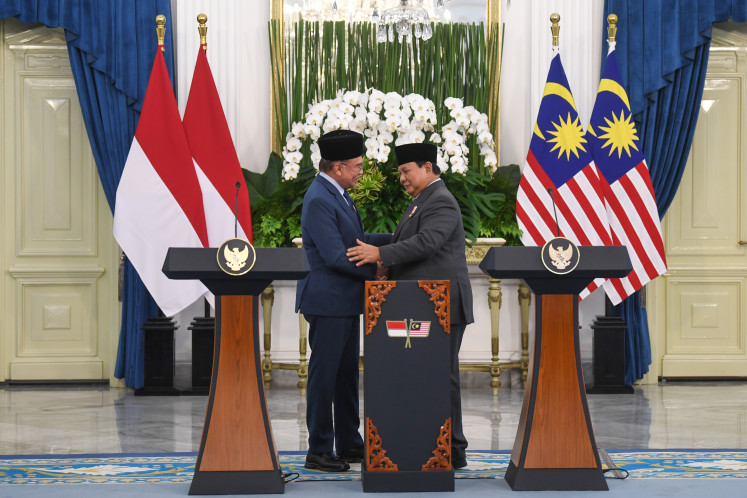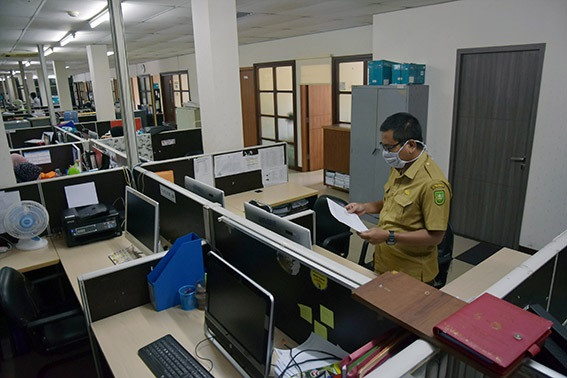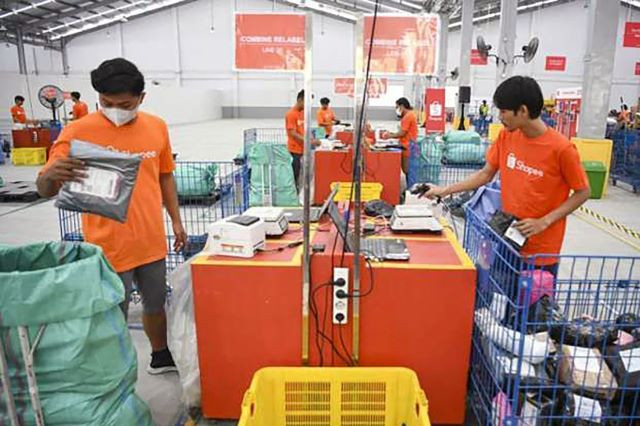Popular Reads
Top Results
Can't find what you're looking for?
View all search resultsPopular Reads
Top Results
Can't find what you're looking for?
View all search resultsThe true new normal: Why Indonesians are sick of flimsy lockdowns
Change text size
Gift Premium Articles
to Anyone
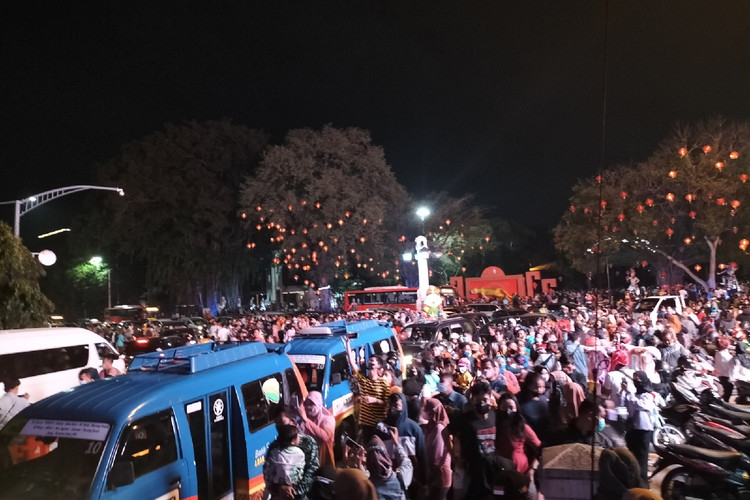
Despite the looming threat of the Omicron variant, Indonesians are becoming less vigilant and eschewing lockdowns. Why?
It seemed like simple mathematics. As the Omicron variant raged through the country, case numbers soared into the tens of thousands, and public restrictions were tightened, Indonesians should have found themselves in a state of high alert but many seem to not have gotten the memo.
“Public places are open and the hand-washing stations in front of them have run dry,” observed Azhari Ayub, an award-winning author based in Banda Aceh. “In most places, they don’t even check our temperature anymore. It’s as if there’s no pandemic.”
Azhari is not alone in observing this declining sense of crisis. On Feb. 4, as reported by Kompas.com, a spokesperson for Jakarta’s Public Order Agency (Satpol PP) stated that his team had broken up 170 events during the month of January because of crowd control concerns. In late January, thousands of maskless concertgoers attended a performance by musicians Tri Suaka and Nabila Maharani in Subang, West Java, leading to the summary closure of the public park where the concert was held.
This breakdown in order got worse during the recent Chinese New Year celebrations. On Feb. 1, a shopping mall in Bandung, West Java, was fined after holding an illegal Chinese New Year performance, attended by thousands. Meanwhile, the local administration in Surakarta, Central Java, was criticized for allowing its residents to roam the streets to see lantern decorations.
However, this lack of discipline has not come out of thin air. After almost two straight years of the pandemic and mixed reviews of the government’s handling of the crisis, Indonesians are sliding into apathy and barely concealed desperation.
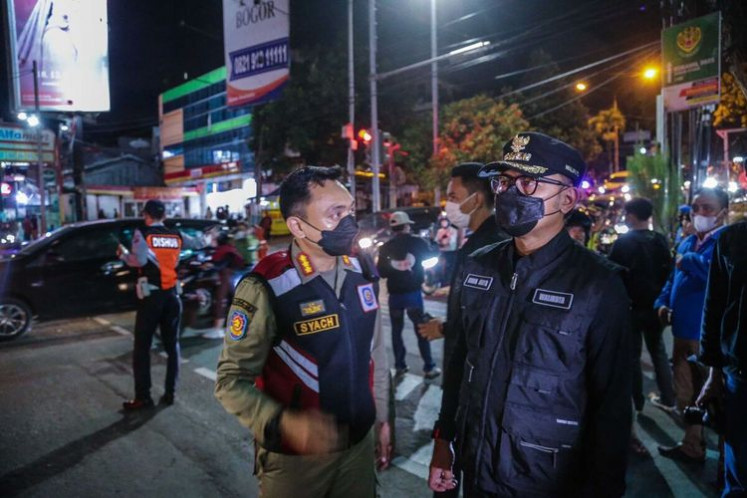
An uncertain beginning
For Bunga, 26, who declined to give her real name, the pandemic came at an inopportune time. The Jakarta resident had consistently worked in the food and beverage industry, meaning that not only could she not avoid crowds, her livelihood depended on them.
“I was afraid of coming to work, but there was no other option than to be cautious,” she said.
Not long after, though, restrictions tightened nationwide and her workplace was forced to send people home. Stricken by fear, she took on freelance jobs and stayed home for the entire year. It was a financially challenging time, she recalled, but she felt she left her job “at precisely the right moment.”
According to Azhari, even Aceh tightened its grip during the pandemic’s early days. “It was shock therapy,” he recalled. “Even villages far on the periphery implemented their own version of lockdowns. They closed down roads and were wary of outsiders.” It may have seemed disorganized and sporadic, but people were at least aware of the pandemic’s potential dangers.
Deep down, though, Bunga and many others in that position knew the situation could not persist. “Lockdowns abroad are implemented with strong economic and social assistance from the government. Not in Indonesia,” said Bagong Suyanto, a professor of sociology in Airlangga University.
This meant that, eventually, some people could simply no longer afford to be locked down.
“We couldn't answer this dilemma between economics and public health then, and it’s impossible to solve this now,” he continued. “Maybe when the pandemic began, people still had savings to fall back on. After two years, that’s no longer the case. So, it’s hard to ask them to stay at home again.”
Many were also concerned to see inconsistencies in how lockdown restrictions were implemented in real life. “People watch the news,” Bagong sighed. “They see politicians breaking lockdown rules, celebrities getting away with not being quarantined after returning from abroad. This convinces them that they don’t have to follow the rules to the letter, because the implementation is unfair anyway.”
“We would see our local politicians go on the news warning people about the pandemic, then the next day we see the same guys in coffee shops, hanging out without masks on,” Azhari said. “Somebody takes a picture of that, and people get second thoughts about remaining at home. If these people are out there, maybe the situation isn’t that serious.”
During her stint working in restaurants, Bunga also observed how her co-workers would sigh at the ever-changing lockdown rules. “We had to wait each week to see if the rules remained the same for public places,” she recalled. “Eventually we didn’t care. The service industry is stunted, and we can’t afford to be cautious anymore. You either get sick or you don’t get paid.”

Mixed messages
Doubts began to rise over the lockdown rules’ fickle nature and their inconsistent enforcement, and the government began to struggle to combat disinformation. “The local government had a great idea of working with popular religious leaders to educate their congregations about the pandemic,” Azhari said.
“But new religious leaders emerged preaching conspiracy theories,” he continued. “They started small, with only 100-200 people attending, but their gossip coalesced there and reached the countryside. Eventually, they started to erode the authority of established religious leaders.”
As the Delta variant’s grip loosened throughout the country, the government came up with a dubious plan to enforce discipline: assign uniformed policemen and military personnel to patrol the streets and promote vaccination drives. This strategy, though, achieved mixed results at best.
“Our research showed that this disproportionate intervention by the military wasn’t effective,” said Irma Hidayana, a public health expert and cofounder of LaporCOVID-19. “They tend to enforce discipline through fear, which is ineffective in mitigating the risks of an infectious disease.”
The government’s approach, she said, should instead be “educational” and evidence-based. “If it’s done through fear, people will only follow the protocols because they’re afraid of violence,” Irma continued. “Once that threat clears, they’ll return to doing whatever they want.”
In some places, this military intervention provoked a more visceral response. For decades, Aceh was the center of a secessionist movement that was violently put down by the government. Though an amicable peace settlement was finally reached in 2004, wounds from this conflict persisted in many parts of the province’s heartland.
“People were also forcibly locked down and the streets were empty at night during the DOM [military operational zone – red] era, too,” Azhari said. “Maybe people recalled that traumatic memory when they were forced to stay at home and they saw military personnel patrolling the streets, keeping them there. In urban areas, maybe this isn’t a big problem. But in the countryside, people are resistant.”
As Azhari traveled across his province, he saw cases of mass anger–especially in the former secessionist strongholds of Northern and Eastern Aceh. “People broke down barricades put up by the police because they rejected a lockdown,” he said. “It’s a reflex, hysteria. ‘I want to go home, I want to go to the market, I want to enjoy the freedom of movement I finally have.’”
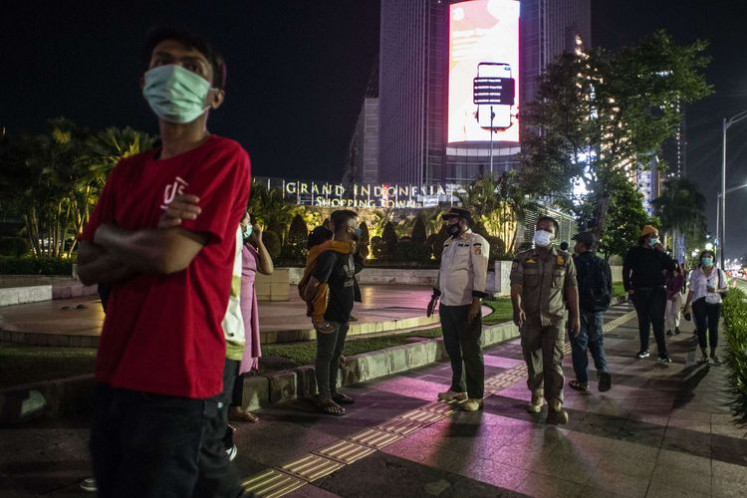
Still a looming threat?
The country survived the Delta wave battered and bruised, and by the end of 2021, it seemed Indonesia had turned a corner. “Cases were down and more and more people were getting vaccinated,” Bunga said. “People were also allowed to go out and concerts started to happen again. So we all thought, maybe this is coming to an end.”
Unfortunately, the reality was not so simple. Omicron was beginning to ravage countries abroad, and Indonesia’s neighbors began to tighten their own restrictions. Indonesia, however, chose to remain relaxed. In early January, a spokeswoman for the Health Ministry claimed that, according to serology surveys, around 86.6 percent of the country’s population had developed antibodies against the virus–confidently proclaiming “super immunity.”
For Irma Hidayana, this set the trend for a complacent response. Instead of taking heed of the warning from abroad, Indonesia elected to relax restrictions. “We were too confident, and we neglected to inform the public about the risks of another outbreak,” she said. “Vaccines can decrease in efficacy, and natural immunity from getting COVID-19 isn’t enough to prevent reinfection.”
Indonesians’ current lax attitude toward Omicron, according to Irma, is a combination of a natural fatigue with “being put to sleep by lullabies” from the government. “Indonesians still have a high degree of trust in their government,” Irma said. “When they see that restrictions are relaxed, concerts are happening, and public places are open, they will think, ‘Oh, it’s not so dangerous anymore. Otherwise the government wouldn’t have let this happen.’”
This reluctance to sequester themselves in their own homes has now transcended class barriers. “It was never possible for lower-income Indonesians to follow the lockdown, but now middle-class and upper-middle class people are reluctant, too,” Bagong Suyanto said. “There’s a desire to step away from the situation, and a weariness with how scary the pandemic seemed to be. You don’t hear ambulances in the streets anymore, Omicron seems less vicious, and people are tired. So they take things less seriously.”
Bunga agrees that people have become desensitized. “I feel hopeless, like things are never going to end, but I can’t afford to be as scared as I was,” she said. “If the world’s ending, then the world’s ending. Getting the virus just seems like an annoying inconvenience these days. I won’t be able to go to work and neither will my housemates.”
“I think people who want to follow protocols are surrounded and defeated,” said Azhari. “We’re alone. We see people meeting each other without masks, crowds everywhere, and everything seems normal. Eventually, even I’m losing my own sense of vigilance.”
Even if lockdown rules are magically imposed again, Azhari is skeptical. “There will be some forms of resistance,” he concluded. “We will say yes to Jakarta’s demands, but in the end we will do whatever we want.”







